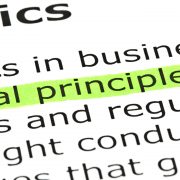Connor Boyack believes the world will be a better place when kids learn and understand – and apply – the core concepts of economics.
This is not government economics, of course. The abstract aggregates and mathematical models of the mainstream economics of the academic elites are deemed to be too advanced for kids. They’re taught in universities with a view to turning anyone with an interest in economics into (a) a fully propagandized Keynesian and (b) a direct or indirect employee of the government or one of its captive think tanks or lobbyist groups.
Kids haven’t run into all these encumbrances yet. Before they do, Connor Boyack hopes to introduce them to the fundamental ideas of the real economics that are relevant to individuals and the world around them. Principles such as the allocation of resources: we always have a longer list of things we could do with our scarce resources (including the scarcest of them all, time!) than exist in the realm of possibility, so how do we decide on the most effective and efficient allocation, the highest and best use? Thinking in this direction leads to the principle of opportunity cost: if you do X, you forego Y, and it’s important to have a decision making process. It’s called economic calculation. It might be a heuristic rather than a formula, but it’s a considered decision rather than a thoughtless one.
Connor also introduces kids to the idea of time preference, which is wrapped up in savings and investment. If we save – sacrifice – today and invest our savings into a productive initiative, we’ll reap a greater reward in the future. We know that many kids have a hard time with this concept – many of us have read about the marshmallow test – yet learning about it and considering the benefits of self-control and the value of the longer term over short term indulgence can be a life-enhancing change.
Of course, kids are not going to be able to relate to terms like time preference and opportunity cost. The words aren’t right for them. And the concepts are too abstract. They need to be clearly grounded in a world that kids understand. A different creative strategy is needed.
Connor’s initial vehicle for teaching kids economics has been The Tuttle Twins series of books. These books feature fast-moving stories and are fully illustrated, so that they are engrossing page-turners for kids. They are very ambitious in making classic content simple. The Tuttle Twins Learn About The Law is a presentation of the principles expressed by Frederic Bastiat in his classic “The Law”. Learning about the law includes natural rights, the difference between right and wrong and government legislation, and the awareness that bad guys can get government jobs and what the government does is often bad, wrong and illegal. The Tuttle Twins And The Road To Surfdom (yes, that’s the right spelling) illustrates the danger of tyranny, the difference between individualism and collectivism, and the nature of the threat inherent in central planning. An afterword introduces F.A. Hayek and the term Austrian Economics.
Connor also learned that kids like to see a narrative where there is good and bad, a protagonist and an enemy, and a story of heroes overcoming villains. In the Tuttle Twins And The Creature From Jekyll Island, the enemy is The Federal Reserve , government produced money and inflation. In The Tuttle Twins And The Food Truck Fiasco, the enemy is crony capitalism and the heroes are entrepreneurs.
The most recent Tuttle Twins edition is The Tuttle Twins And Their Spectacular Show Business, which is devoted to the subject of entrepreneurship. The Tuttle Twins absorb and follow the free market theory of entrepreneurship that starts with self-awareness (Who Am I?), self-resourcing (Who Do I Know and What Do I Know?) and self-efficacy (What Can I Contribute?). Can kids learn to be entrepreneurs? Certainly, says Connor:
Just like economics is a way of thinking, I think so too is entrepreneurship, and I believe we can inspire young people to look for opportunities and solve problems and be creative in their thinking. Through practice, study, and incremental opportunities, the child, once an adult, is going to have a lot of practice in entrepreneurship.
Listen to folks like Mark Cuban. He was selling stuff as an 11 year-old and a 12 year-old and was going door to door. There are many ways that kids can be practicing entrepreneurship, learning from their mistakes, and growing and refining their abilities. When they are an adult and have a full legitimate opportunity, they can hit the ground running, That’s what I am hoping this book can help kids with.
Connor is teaching kids not only economics but also values, including the ethics of capitalism, and self-reliance and self-empowerment. As a father, he wanted his own kids to absorb and understand the ideas he believed in, and could not find any educational materials to help them do so. In the spirit of entrepreneurship, he and his wife decided to create a book. They did not have the idea of a complete series at first, just a trial to see if people were interested. The market response was tremendous and now there are 8 books in the series and more to come. Over 200,000 copies have been purchased. Not only do kids enjoy and learn from Tuttle Twins books; parents tell Connor that they enjoy reading them to and with their kids, and they, too, are introduced to new ideas and prompted to learn more.
Like any serial entrepreneur, Connor is inspired to go further. He began to realize that while the books continue to sell well, “we’ll always be playing catchup. To get ahead of the curve, we have to get into the schools”.













